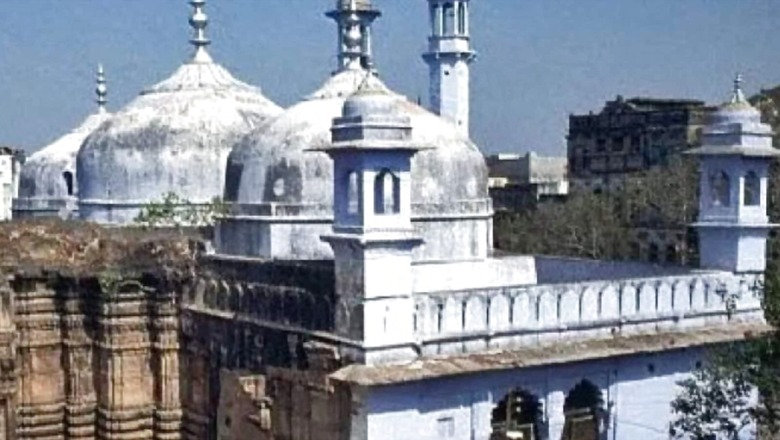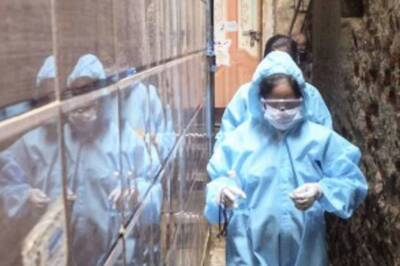
views
A district court in Varanasi will on Monday resume hearing arguments on the maintainability of a plea by five Hindu women seeking permission for daily worship of the Shringar Gauri Sthal in the Gyanvapi mosque complex.
The court had heard arguments from the Muslim side against the maintainability of the plea on May 30, following which district judge AK Vishvesh posted the matter for further hearing on July 4. The Gyanvapi mosque management committee (Anjuman Intezamiya Masjid) contends that the civil suit is barred under the Places of Worship Act but Hindu petitioners want that the survey report be reconsidered.
Separately, a fast-track court hearing a plea seeking permission to allow worship of a ‘Shivling’ claimed to be found during a videography survey in the Gyanvapi-Shringar Gauri complex has posted the matter for hearing on July 8. The survey was conducted in May on the orders of a lower court.
What is the Places of Worship Act?
The Act, which has been in force since July 11, 1991, prohibits conversion of places of worship, and maintains “the religious character of any place of worship as it existed on the 15th day of August, 1947 and for matters connected therewith or incidental thereto”.
Section 3 of the Act prohibits any conversion of places of worship. “No person shall convert any place of worship of any religious denomination or any section thereof into a place of worship of a different section of the same religious denomination or of a different religious denomination or any section thereof,” it says.
Section 2 states if any appeal or other proceeding in regards with the conversion of religious character of any place of worship existing on August 15, 1947, pending before any court, tribunal or other authority “shall abate. Any legal proceedings pending on the commencement of the Act “shall be disposed of”.
Section 4 (1) says “the religious character of a place of worship existing on the 15th day of August, 1947 shall continue to be the same as it existed on that day”.
Section 5 says the Act does not apply to Ram Janmabhoomi-Babri Masjid case. “Nothing contained in this Act shall apply to the place or place of worship commonly known as Ram Janma Bhumi-Babri Masjid situated in Ayodhya in the State of Uttar Pradesh and to any suit, appeal or other proceeding relating to the said place or place of worship,” it reads.
The Supreme Court bench, while delivering the verdict in 2019, said, “In providing a guarantee for the preservation of the religious character of places of public worship as they existed on 15 August 1947 and against the conversion of places of public worship, Parliament determined that independence from colonial rule furnishes a constitutional basis for healing the injustices of the past by providing the confidence to every religious community that their places of worship will be preserved and that their character will not be altered.”
“The Places of Worship Act imposes a non-derogable obligation towards enforcing our commitment to secularism under the Indian Constitution. The law is hence a legislative instrument designed to protect the secular features of the Indian polity, which is one of the basic features of the Constitution…”
How was the Act Passed?
The then home minister in the PV Narasimha Rao Cabinet, Shankarrao Bhavrao Chavan, introduced the Bill to prevent communal flare-ups in the country amidst the Ram Janmabhoomi movement was gathering steam. BJP leader LK Advani’s Rath Yatra received massive support and he was later arrested in Bihar. Kar Sevaks were shot in Uttar Pradesh under the Mulayam Singh government.
The BJP had opposed the Bill. Former MP Uma Bharti had raised the Kashi Vishwanath temple-Gyanvapi mosque dispute, and said, “Was not the intention of Aurangzeb behind leaving remnants of the temple (he destroyed) at the site of a mosque, to keep reminding Hindus of their historical fate and to remind coming generations of Muslims of their past glory and power?” as reported by The Indian Express.
How Many Times Have the Act Been Challenged?
BJP leader Ashwini Kumar Upadhyay had challenged the Act last year, saying that the law was the breach of principles of secularism laid in the Constitution. “The Centre has barred remedies against illegal encroachment on places of worship and pilgrimages and now Hindus, Jains, Buddhists, Sikhs cannot file a suit or approach a high court under Article 226. Therefore, they won’t be able to restore their places of worship and pilgrimage including temple endowments in the spirit of Articles 25-26 and the illegal barbarian acts of invaders will continue in perpetuity,” Upadhyay’s petition read.
The petition is related to a legal battle in a trial court over “reclaiming the birthplace of Lord Krishna in Mathura”, which was affected by provisions of the 1991 Act.
Another petition challenging the Act was filed by Vishwa Bhadra Pujari Purohit Mahasangh, which is pending in the Supreme Court.
Read all the Latest News, Breaking News, watch Top Videos and Live TV here.




















Comments
0 comment